A 'Common Hoodlum's' Coming of Age: the U.S. Senate Candidacy of Larry Hamm
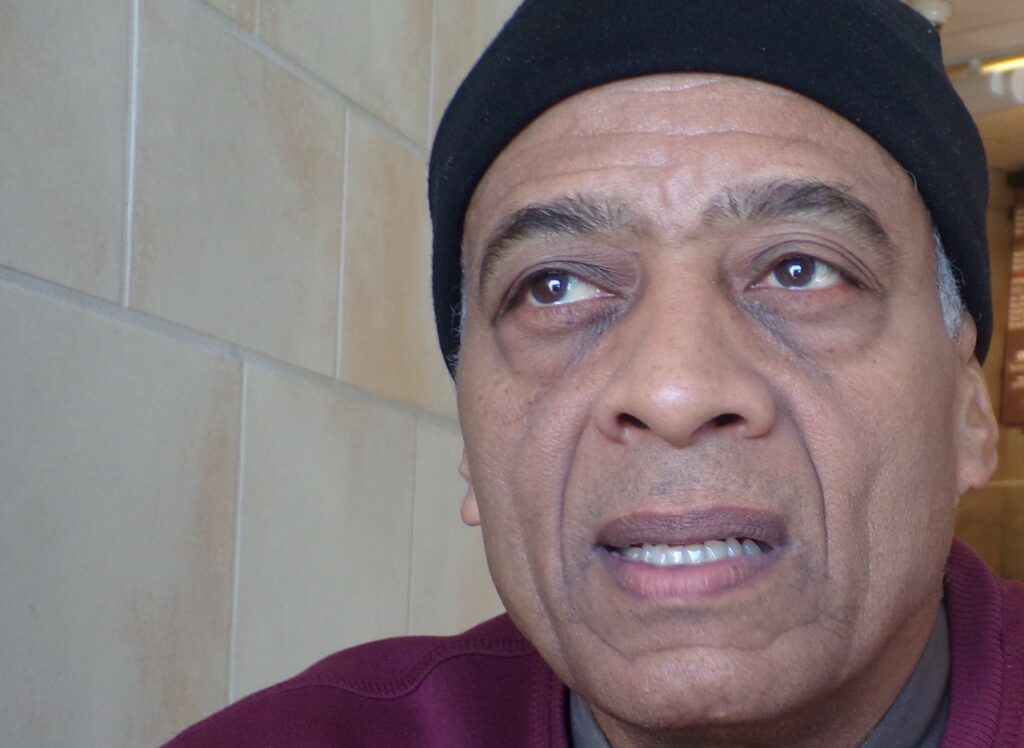
The tug of war for the soul of Lawrence "Larry" Hamm between government and activism, pragmatism and
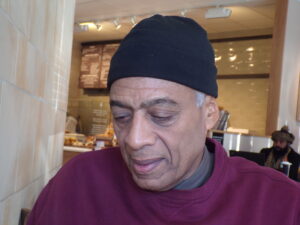
radicalism played out in his hometown of Newark, the cultural and political connecting point, where for years activism alone appeared to have the decided upper-hand; that is until now, as he undertakes a street-level statewide run for elected office, 45 years after his power-defying bid for an at-large city council seat.
His direct challenge of U.S. Senator Cory Booker carries multiple layers of dramatic resonance, overlapping storylines and even inevitability. Both born in Washington, D.C., they came to New Jersey as babies, 16 years apart, Booker the son of IBM executives to Harrington Park; and Hamm the son of a truck driving father and seamstress mother to the Central Ward of Newark. They both attended ivy league colleges, Booker Yale and Hamm Princeton, and both saw Newark as the proving ground. But while Booker spent a brief time as a tent-pitching protester before winning his first city council seat in 1998 and thereafter leaping upward from one elected office to the next (councilman, mayor, senator, and now, he hopes, president); Hamm lost his 1974 citywide shot and then, in the early 1980's, founded the social and economic justice-agitating grassroots outfit, the People's Organization for Progress (POP).
ORIGINS
For Hamm it started back in the spring of 1967 when he threw rocks at his elementary school as repayment for the school ejecting his friend.
The school's principal responded by ejecting him.
His mother had cried when Hamm's father died when the boy was four years old.
But with little Larry seemingly headed for oblivion on the streets of Newark, his mother broke apart in the principal's office and begged for her son to be readmitted.
"Your son," the principal told her, "is a common hoodlum."
Still, they let him back in.
A mother's tears hit harder than rocks.
Between his elementary and high school careers, in the summer of 1967, long-boiling tensions in Newark spilled with the July 12th police arrest and beating of cab driver John Smith at the 17th Avenue Precinct and subsequent rebellion by blacks against the city's white establishment.
"It happened about a mile away from my house as the crow flies," said Hamm. "All the ingredients were there for an explosion. Someone told me Springfield Avenue was on fire."
He stood on the front porch of the building where he lived and looked across the street at the violent spectacle of people in the sweltering summer heat tearing garage doors off the front of a dry goods warehouse.
He looked up at his grandfather, Claude Cobb, a boiler man and WWI veteran, and wanted to know why everybody was so upset.
Why were blacks overrunning the streets?
"My grandfather didn't start the discussion with Newark," said Hamm. "He started the discussion with his service in the military when he was in the army and they went to France, and the French people were asking to see their tails. I was like, 'tails??!!' That was the first real discussion I ever heard about race - the night of the rebellion."
Hamm had gone down south before the riot, and was with his mother and aunt on the train out of D.C. when the conductor made them move to the back of the train. But he had been so young at the time all he really remembered about the incident was the commotion caused by his hellraising Aunt Gladys as she resisted but finally relented and went to the back of the segregated train.
Now his grandfather was trying to illustrate how race affected people on a personal level.
"He was talking about his life," Hamm said. "He hated the south. He was from the south. He told my mother he did not want to be buried down south."
Was his grandfather expressing affirmation of the necessity of black resistance?
"I don't know," Hamm said. "The discussion was not that deep. My grandfather was not that militant. He was a hardworking man, who worked his whole life, got sick and didn't go to work for two weeks and then he died. He's buried in Glendale Cemetery in Belleville in the veteran's section five rows from my father, who was a WWII veteran."
But on that night and in the aftermath of the initial eruption, Newark was the warzone.
The regional news networks carried coverage of the "riots".
"I saw contingents of national guard marching and rolling in, halftracks jeeps and trucks just like in the
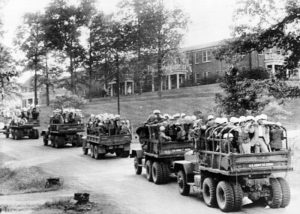
WWII movies, on 16th Avenue and 12th Street. Martial law was declared. We were under military occupation. Twenty-six people were killed. Then the guard pulled out two weeks after and what was remarkable was the way things returned so quickly to normal. I thought school would be delayed, but they started in September, right on time."
Before he went to Arts High School, his 8th grade teacher took him to the top floor of Bambergers downtown where a man was signing books in a crowd amid TV cameras. It was legendary Olympic track star Jesse Owens, who signed one of his books for Hamm.
"I was 13 years old when I met this great man, but the real depth of what he had done - fighting the racism of the Nazis - had not sunk in to me," he said.
He touched the hand of greatness somewhere within the embers of the rebellion.
THE MAN FROM UNCLE
Larry Hamm went to Arts High School still thinking about his mother sobbing in the principal's office back in junior high.
At student orientation, he felt focused.
He was committed to full redemption, to being a good student and making the most of an opportunity.
Then the student council president - who was at that time called the student mayor of the school - an llya Kuryakin-lookalike who wore a blond Beatles-style haircut, climbed onstage. He was expected to talk about student government, the upcoming Halloween party, and UNICEF collections.
He proceeded to rail against the War in Vietnam.
"I was sitting there, and I had this real conscious thing in my mind that I had a second chance," Hamm said. "I had messed up. This is a personal thing, not a racial thing. But this kid, whose name was David, he doesn't talk about things asked for. He starts talking about Vietnam. So the principal gets up and tells David to stop talking about Vietnam. The principal comes over and tries to physically drag David from the podium. David and the principal get into a fight onstage in front of the whole auditorium."
Suddenly Hamm was thinking something very different from what he thought when he walked into that room as a burgeoning academic.
"I thought, 'I want to be in student government,'" he said. "I already knew the consequences of opposing authority, having just been suspended. But he was onstage fighting the principal. I couldn't find Vietnam on a map. But I knew this was important. I knew I wanted to join the student council, because if he could put himself on the line like that, there was something serious going on."
Hamm became deputy mayor, and by the time he was a senior, he was mayor of Arts High School.
"At that point, I was on the road to political consciousness," he said.
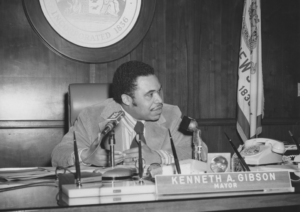
While he was determinedly campaigning at school, someone else was campaigning citywide against incumbent Hugh Addonizio, and in 1970, Newarkers elected Ken Gibson their first African-American mayor.
"I didn't work in the Gibson campaign," said Hamm. "I was not conscious of what was happening in city politics. I was tending to school politics. It was happening around me."
It was happening a block away, in fact, where stood the headquarters of poet-activist Amiri Baraka (father of future Newark Mayor Ras Baraka), on the future site of St. Benedict's.
On his way to school each day, Larry Hamm walked past that headquarters.
Two men stood out front in green dashiki uniforms with black pants and afros.
John Coltrane music flooded the area.
"I didn't go in, but I knew it was a black thing," Hamm said. "I saw them as something unusual."
One day during the 1970's teacher's strike, and just prior to the Gibson election, the principal brought Arts High School's government reps down to the Latin classroom where a man talked to them about the political situation.
"I never heard anyone talk that way," Hamm said.
It was Baraka.
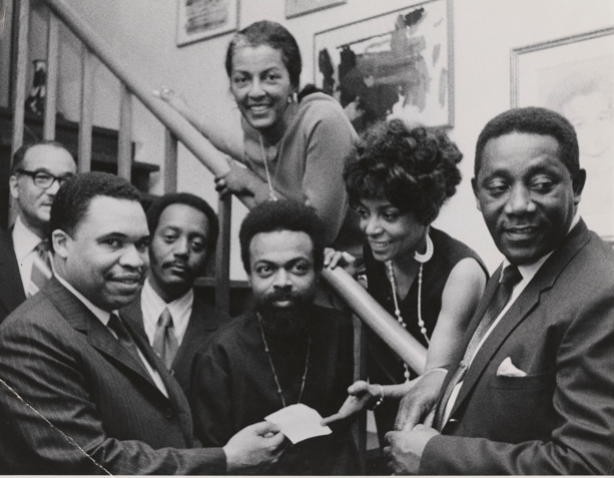
A year later in March of 1971, Hamm - now a track and field star in the mile - was organizing a student walkout in the midst of a second teacher's strike. The students learned that if they missed 35 consecutive days of school they wouldn't graduate and go to college as planned. Hamm was heading - he hoped - to Princeton. He didn't want to be delayed. The principal found out about his planned protest and called him into her office.
If he went ahead with the walk out, he would be suspended, he wouldn't graduate and he wouldn't go to college.
But he and the students were ready to go.
"I didn't want to be called an Uncle Tom," Hamm said.
He went through with the walk out.
Ninety-percent of the student body joined him in the street, where they marched to what at that time was the Double Tree Hilton, now the Gateway Hotel. Two-hundred students got inside and went up to the sixth or seventh floor and sat down, determined not to move.
Then Mayor Ken Gibson appeared.
"He came and told us he understood why we were doing what we were doing, and told us if we worked with him he would end the strike," Hamm said. "We weren't on the board side or teacher's side. We were kids who wanted to graduate. And yes, that lesson was eminently clear. I tell kids all the time: they have power. The mayor came to us. That was the first time I saw Ken Gibson."
He had been not even a year in office.
Three months later, as their young star prepared to go to Princeton University, the Hamm residence received a knock on the door.
It was an aide to Mayor Ken Gibson.
He had a question for Hamm.
"The mayor wants to know if you would be a member of the Newark Board of Education."
There was a vacancy.
"I just got accepted to Princeton University," he told the aide.
"You want to go to school? You'll be able to go to school and go to Princeton at the same time."
Hamm was focused.
"I had gone into the lion's den, survived the teacher's strike that threatened our graduation, I had applied to Princeton, Harvard, and Yale and been accepted at all three."
Still, he couldn't resist.
He would go to Princeton.
But he couldn't completely leave Newark.
On July 1, the 17-year old assumed the oath of office as the youngest full voting member of a board of education.
"I wasn't even old enough to vote," he said.
In four years he went from someone who barely graduated, to a Princeton University-bound member of the Newark Board of Education.
THE LOCAL COLLISION BETWEEN GIBSON AND BARAKA
Amiri Baraka was not happy with Gibson, however.
The internationally recognized beatnik black power poet and self-professed communist lost faith in Gibson almost immediately.
On the heels of the 1967 troubles, coming out of the 1969 Black and Puerto Rican convention, Baraka and his followers put the pre-condition on Gibson that if he became mayor he needed to appoint a black police director.
Gibson didn't.
He installed, in fact, an Irish American.
Baraka was livid.
It would take a long time for Gibson to make Lieutenant Edward Kerr the city's first black police director.
Gibson - through intermediaries, and never in person - was pulling Hamm on one side.
Baraka - personally, face to face - was pulling on the other.
Then there was Latin class at Princeton, which might has well have been the actual experience of the Punic Wars.
"I was unprepared," Hamm said of his studies.
The Brick City revolution now extended to include Gibson as a major local disappointment - and a political target.
Baraka and his allies summoned their best people to oppose him as they approached the 1974 election.
Newark was too intense.
Too urgent.
Hamm dropped out of Princeton.
With Baraka's backing and blessing and with his own African name (Adhimu Chunga (Swahili for "important youth") given to him by the poet, Hamm ran for an at-large seat on an anti-Gibson slate with Ralph Grant, Julia Grant, Jim Nance, and Dennis Westbrooks.
He lost.
But he went back to Princeton in 1974, this time with a factory worker first wife and his first daughter behind him, and graduated cum laude with a degree in politics.
Was it all an academic grind?
Hell, no.
"On campus, we formed the People's Front for the Libertion of Southern African, and got Princeton to divest from companies that did business with South Africa," Hamm said.
Then he went back to Newark.
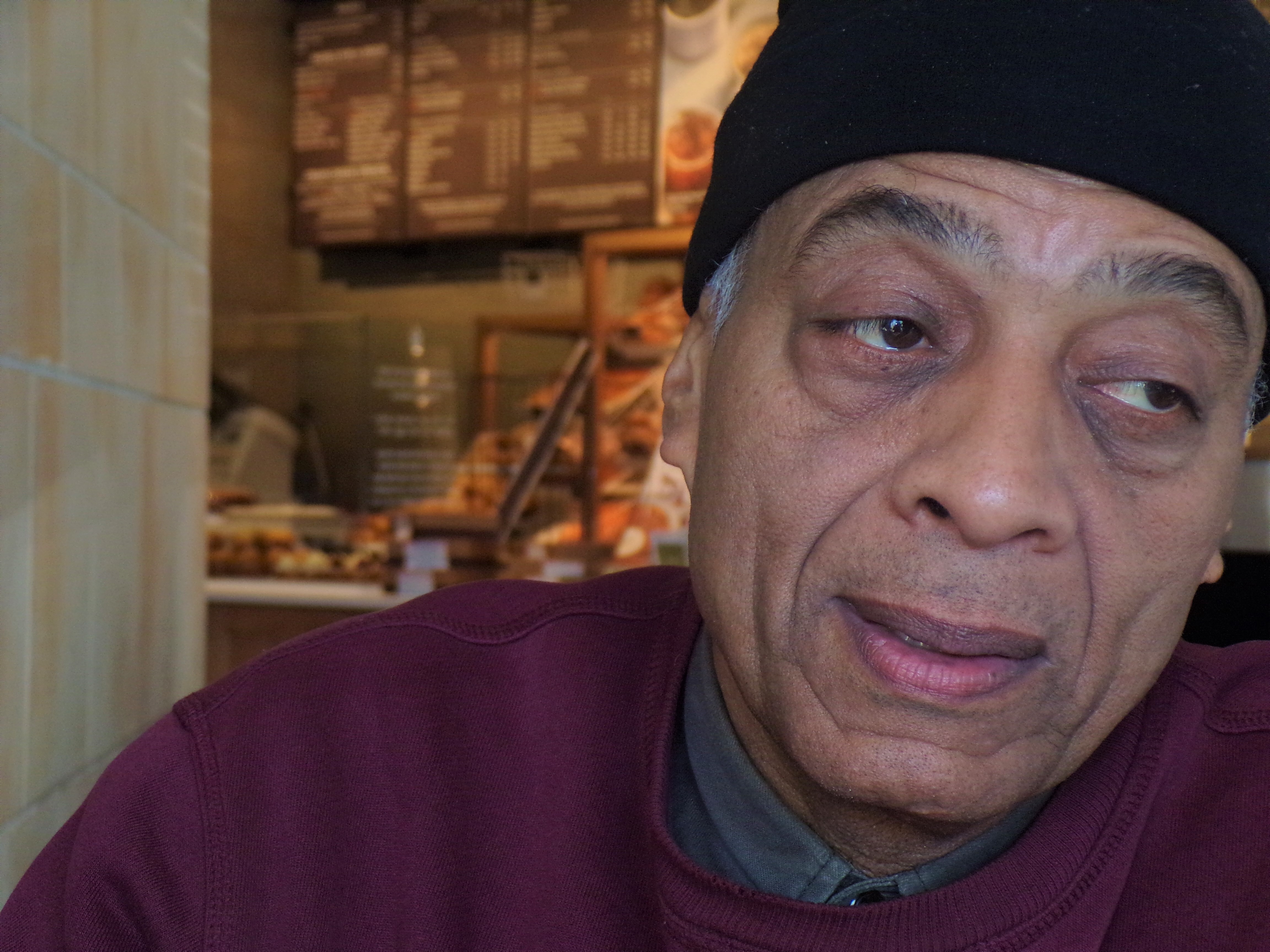
THE ROAD TO a 2020 U.S. SENATE RUN
Forty years of radical, unshakeable activism followed.
Jesse Jackson for president.
Reparations for the sons and daughters of enslaved Americans.
Anti-police brutality campaigns.
Social and economic justice actions.
Recreational marijuana legalization.
Expungement.
Abolish the electoral college.
A near-fatal car accident.
A second marriage.
Two more daughters.
A progressive independent bid for the assembly in the 28th District against Senator Ronald L. Rice's (D-28) slate in 1987.
Ongoing anti-war efforts.
Hamm stood on the steps of city hall the day after George W. Bush beat John Kerry and told people not to cry.
"He was trying to out-warrior the warrior," he said, standing at the side of fellow progressive state
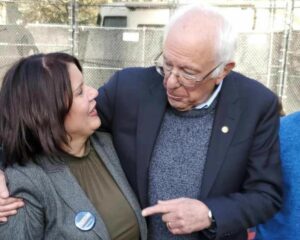
Senator Nia Gill (D-34), decrying Kerry's fatally compromised aye vote for the use of force in Iraq.
In 2016, Bernie Sanders with his socialist message of universal healthcare engaged an always impassioned Hamm in a national presidential campaign.
When Sanders reemerged as a 2020 contender, Hamm signed on without reservation as chair of the Vermont Senator's New Jersey presidential campaign.
He believes in the cause so intensely that he will personally run with a lifetime of organizing and activism at his back to ensure Sanders performs well in his home state.
"I will campaign in every city in New Jersey," said Hamm, ally of former Working Families Director Analilia Mejia of Elizabeth, who is now political director for Sanders's national campaign.
“Beating Donald Trump is the floor; it is not the ceiling,” Booker said in Adel Iowa on Sunday on the presidential campaign trail ahead of the Feb. 3rd caucuses. “It gets us out of the valley; it doesn’t get us to the mountaintop. I am running for president because I want to get to the mountaintop!”
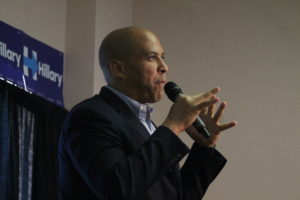
Back in New Jersey, in Essex County, it's not about Booker, Hamm, the Democratic candidate insists, when asked about his likely incumbent opponent in the Democratic Primary, who's still committed to winning the presidency, his fellow Ivy Leaguer and Newark doppelganger who went the way of elected office when the founder of POP stayed street only to double back now on the prospect of a collision in his sixties.
It's bigger, Hamm argued.
Sanders is the national-sized expression of the people power agenda Hamm awakened to in the 1960s and dedicated his life to: the fair housing for blacks activist arrested, resurfacing in office with the same uncompromising aims as himself.
The old arcs of history and influence return and convergence.
"Taking Trump out is not enough," Hamm said. "Normal is what helped get Trump into office. This is the double V sign we have to have here, just like the NAACP employed: victory against fascism abroad and victory against domestic fascism. Candidates that were 'normal' brought us to Trump."
That said, "I am a Bernie Sanders supporter working to make sure he is the nominee, but if he doesn't get it, I will support whoever the nominee is, because we must beat Donald Trump, who is the titular head of nascent fascism in this country."
But aren't he and Sanders two inflexible radicals from another time, he is asked, two surviving emblems of an age incapable of compromise? "They said FDR [Franklin Delano Roosevelt] - who put people to work - had an agenda that was too radical," Hamm said.
It was Tuesday, the morning of Christmas Eve day, and, incidentally, Hamm's birthday.
After he finished his interview, the old high school track and field man who once met Jesse Owens in crisis-torn Newark, went jogging at Brookdale Park in Bloomfield, as he does annually at this time.
Hamm wrote on Facebook on this occasion two years ago a sentiment he said he stood by this week: "I jogged 4 miles, 16 laps around the quarter mile track there. Last year I did three miles. Next year, weather and body permitting, I hope to jog 5 miles on my 64th birthday. My thanks to my daughter Imani for going to the track with me and taking this picture yesterday. For my birthday she gave me a new pair of running shoes. And to celebrate my birthday we went to the movies last night. It was fun and we both enjoyed the film. It was a good birthday. I am glad to be alive. At this time in my life, I face many difficulties and personal challenges, but I have much to be thankful and grateful for. I have been in the struggle for racial, social, and economic justice for the last 46 years of my life, since I was a teenager. It is because of the support and encouragement of so many of you that I have been able to stay in this race, to last this long, and to come this far. This is the last lap and I am going to keep fighting until I cross the finish line."
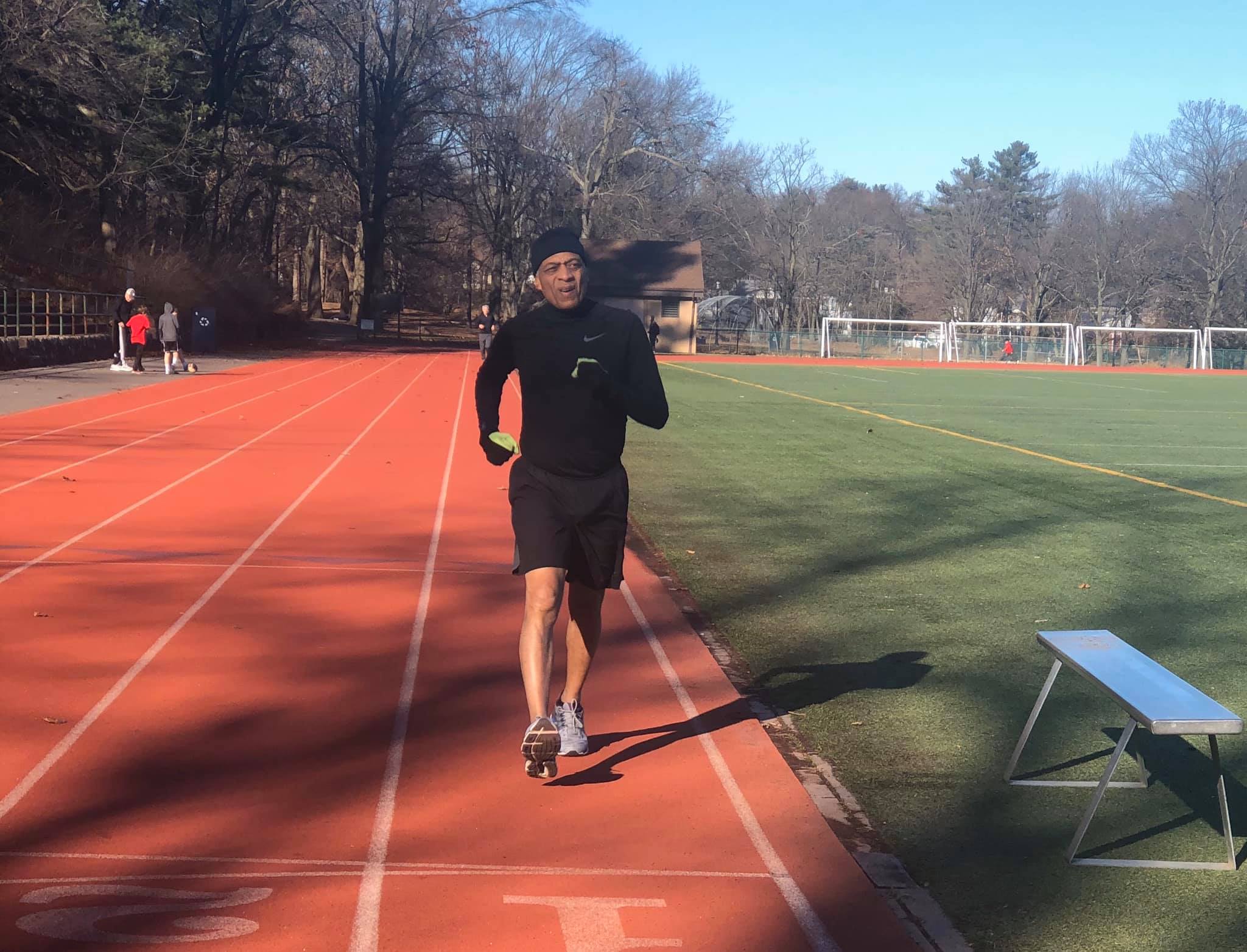






The article definitely captured the"essence" of Larry Hamm! Kudos to the writer, reporter ?.